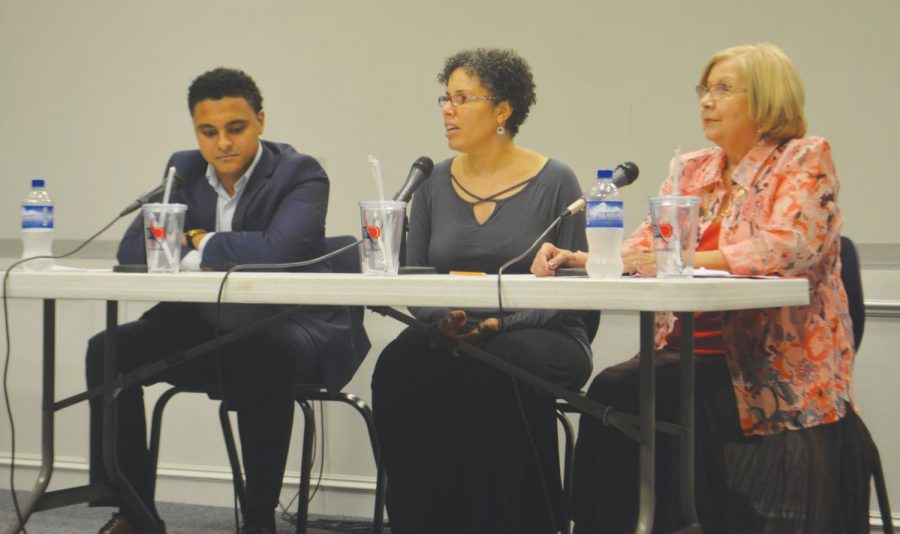Panel expresses importance of Hispanic heritage to students
Photo by: Rosaline Abuaita
Panelists Michael Youssef, Adalia Ellis-Aroha and Paula McGill speaking to FMU students during an open floor discussion celebrating Hispanic Heritage Month on Sept. 27.
The FMU Office of Student Affairs and Campus Activities Board hosted the annual Hispanic Heritage Program on Sept. 27 at the Lowrimore Auditorium in honor of Hispanic Heritage Month.
This year’s program, which was titled “Hispanics: One Endless Voice to Enhance our Traditions,” consisted of a panel of three people with different roots in Hispanic heritage. The speakers included Paula Tejeda, a retired law librarian and president of the Círculo Hispanoamericano de Charleston who was born and raised in Puerto Rico; Michael Youssef, an FMU alumnus and area sales manager for Performance Foodservice who was born and raised in the Dominican Republic; and FMU’s own Adalia Ellis-Aroha, a Florence S.C. native who uses Afro-Latin dance to help educate students about the roots of the dance genre.
The program began with a brief background on Hispanic Heritage Month, given by Alex McGill, FMU student life specialist for student engagement.
“This is a noteworthy period for countries such as Costa Rica, El Salvador, Guatemala, Nicaragua and Honduras,” McGill said. “Their beliefs and heritage give them an important perspective in today’s society.”
The panel was asked a series of questions by NPC Panhellenic President Zaira Reyes about the importance of Hispanic heritage and traditions.
“We need to feel that there is somebody,” Tejeda said. “That we are needed, that we are protected, that we are cared for and that we care for somebody. It is something that used to be contained in every kid, in every family in every town.”
While many topics were addressed by the panel, the themes of hard work and family were prominent.
“Growing up, I would see my grandmother, my mom and my dad get up at 5 a.m. every morning and they wouldn’t get home from work until 10 p.m.,” Youssef said. “Be grateful for everything you have, help others when you can, work hard for what you have and you will succeed.”
To the panel, their heritage was more than just a part of their past; it helped shape their view of life today.
“I was taught to respect and value my heritage and my family,” Tejeda said. “I was taught to love my country.”
The program concluded with an open floor for audience members to ask the panel questions, and the closing remarks were given by Caroline Shelley, executive chair of Campus Activities Board.
